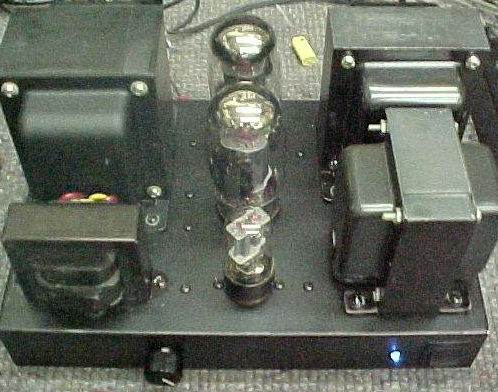
Welcome to John Bedini's Amplifier Pages
The class "A" SE Amplifier that started it all:
the model 10 mono parallel
KT88 tube amplifier.

This Amplifier used a 6SN7 low Mue driver to power the parallel KT88 tubes
Bedini is going to bring this amplifier back into production in
December 1- 2002
orders can be placed at www.bedini.com
![]()
These are some of amplifiers we were building in high school electric shop,
50's 60's:
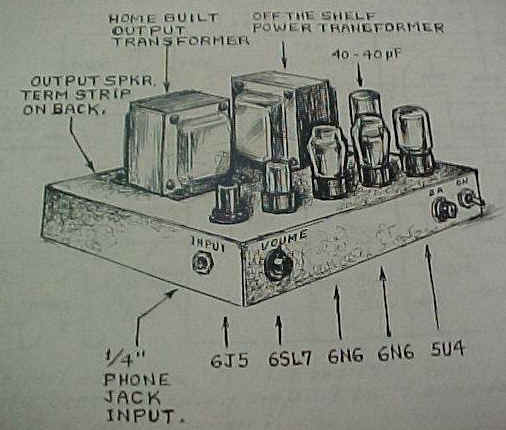
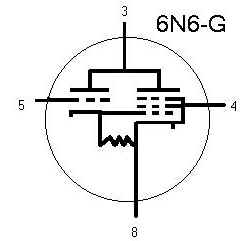
This amplifier's output was between 23 to 24 watts. This is the internal diagram of the 6N6-G tube with built in ballast resistor from what I can remember. It reminds Me of a darlington transistor," good sounding tube".
For good output transformers. it would take us three days to wind them - but what a difference in sound because of the increase in iron in the transformer!
![]()
Bedini/Strelioff
Amplifier
Model 200/200
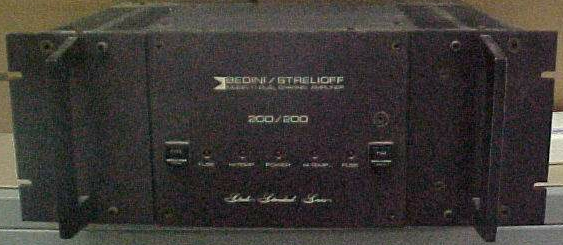

This amplifier used the first feed forward dual diff-amp front end. the output stage was a quasi-complementary design, John Bedini and Jack Strelioff were the first amplifier company to do it with this new design you could split the sing wave into a plus and minus and put it back together again in the output , with decreased distortion. These amplifiers in the 70'swere the first to drive the Infinity QSL loudspeaker systems at ear- busting levels of over 450 watts RMS. The Amplifiers were in a "Pull out Modules" (as can be see from the picture) The front panel included , over tempeture lights and fuse lights,and a power indictor. The output transistors that were used were the RCA 1B05's. the circuit boards were mounted inside the modules connected by Molex connectors. The company lasted for about 3 years, then John and Jack split up the partnership to go their separate ways.
![]()
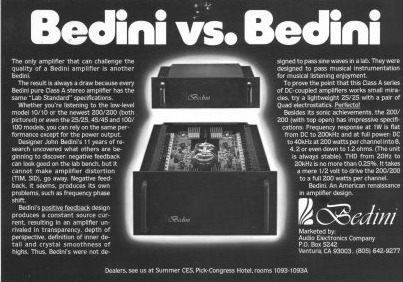
These Amplifiers were some of the best that could be built at the time and are untouchable to this day in sound quality.
What did the add say?
The only amplifier that can challenge the Bedini Amplifier is another Bedini. The result is always a draw because every Bedini pure class A stereo amplifier has the same "Lab Standard" specifications. Whether you're listening to the low-level model 10/10 or the newest 200/200 (both pictured) or even the 25/25, 45/45, 100,100 models, you can rely on the same performance except for the power output. Designer John Bedini 11 years of research uncovered what others are beginning to discover: negative feedback can look good on the lab bench, but it cannot make amplifier distortion (TIM. SID) go away. Negative feedback it seems, produces it's own problems, such as frequency phase shift.
Bedini positive feedback design produces a constant source current, resulting in an amplifier unrivaled in transparency, depth of perspective, definition of inner detail and crystal smoothness of highs. Thus, Bedini's were not designed to pass sine waves in a lab. they were designed to pass musical instrumentation for musical listing enjoyment.
To prove the point that this class A series of DC-coupled amplifiers works small miracles, try a lightweight 25/25 with a pair of Quad electrostatics, Perfecto!.
Besides its sonic achievements, the 200/200 (with top open) has impressive specifications: Frequency response at 1W is flat from DC to 200Khz and at full power: DC to 40Khz: at 200 watts per channel into 8,4, or even down to 1.2 ohms ( the unit is always stable). THD from 20 to 20Khz is no more then 0.25%. It takes a mere 1/2 volt to drive the 200/200 to a full 200 watts per channel.
Bedini Amps: An American renaissance in amplifier design.

The power amplifier board one channel, on the model 200/200
17 250 Volt, 15 Amp Transistors
Model 200\200
![]()
The Model 100/100
Bedini
Dual Transformer Supply
Class A Amplifier.
This amplifier was rated at 120 watts at clipping into 8 ohms
240 watts at 4 ohms
5hz to 30khz at no more then .25% THD.
This amplifier worked wonders driving Infinity speaker systems
down to 1.2 ohms in the Bass frequencies
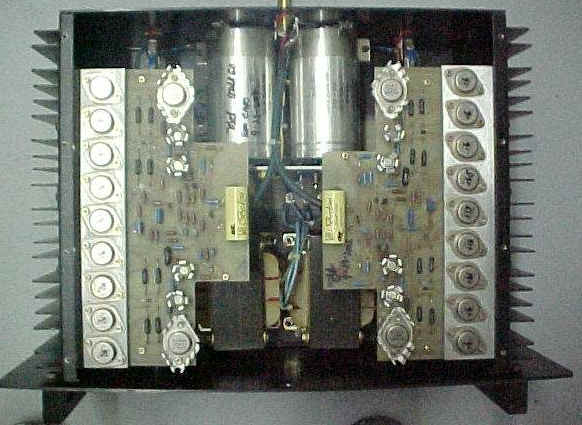
This Amplifier will be produced in the "Vintage Series 100 Watt Mono Blocks"
coming up in December 1-2002.
The Vintage Series looks like the old Dynaco's of the 60's and 70's
I will be putting up pictures of the Vintage Series along with all the specifications.
You may contact gbedini@icehouse.net or gary@bedini.com for details.
Copy write John Bedini Nov 18,2002.
Bedini Electronics
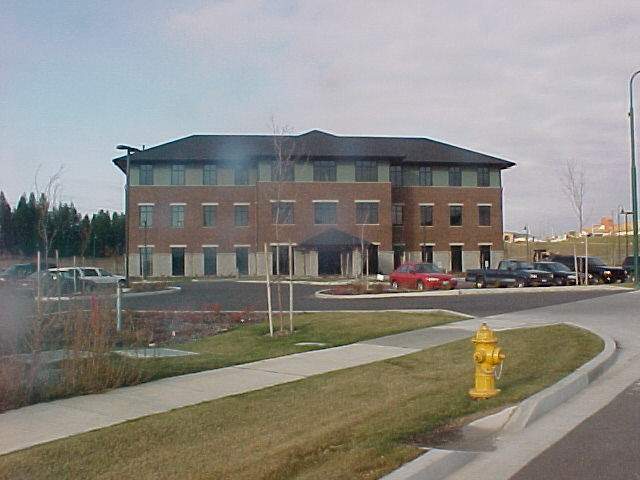
We moved! Bedini Electronics, Inc. in Coeurd d' Alene, Idaho
Bedini is currently remodeling this building to build the Vintage amplifier series. Bedini has been asked to produce an amplifier that is affordable in price for the public, while keeping the sound quality to the highest standards. John Bedini has been working around the clock to bring the very best sounding amplifier to market. John and Gary do all the listening testing as the pro-type amplifiers are put together. John does not like pictures taken in the shop area because of some of the other designs he is working on. He feels that this is going to be the giant killer in the market place. He has said that these amplifiers are going to compete with amplifiers costing five times the price and out perform them, and from what we have seen and heard he has got the answer and the sound to do it. For years, John has developed sound processing equipment for the recording studios, BASE is a example of that on most of the CD that are recorded to this day. B.A.S.E. stands for Bedini Audio Special Environment . The process was used on movies like Star Trek, Hunt For Red October, and many others too numerous to list here. Stay tuned more coming
![]()
The old Bedini building
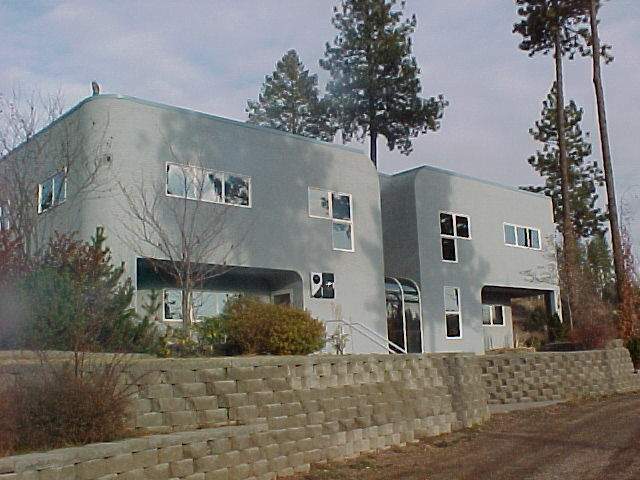
This building was setup for the current amplifiers and has full machine shop capabilities.
![]()
The Vintage Circuit Board.
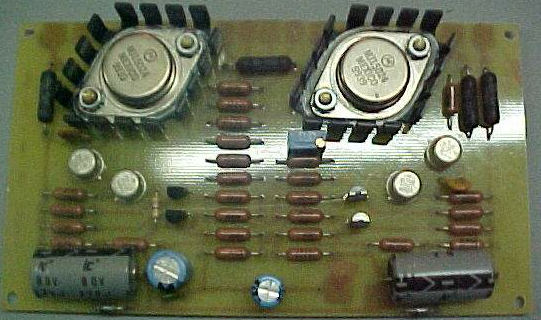
The Vintage Series circuit boards now takes the place of the older boards with the least amount of devices in the signal path. The vintage boards give the best sound quality, because of the point- to- point wiring connections to the output stage. The Vintage series amplifier are all hand wired; there are no circuit boards in them..
![]()